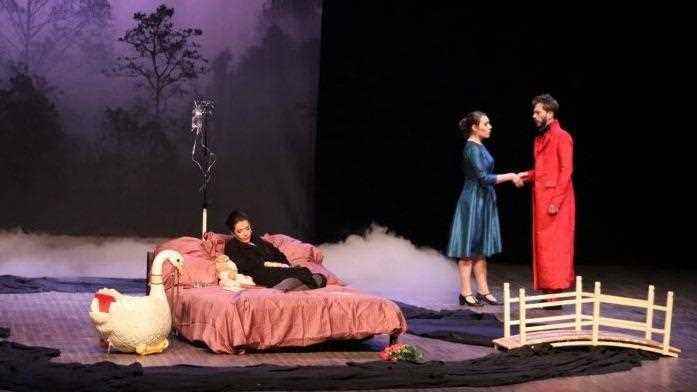Fabrique Opéra, based in Grenoble, involves 400 to 500 students in opera projects in order to fight against the aging of the public.
How to prevent opera, with a minority and rather elderly audience, from declining in France? The Fabrique Opéra association has set itself the task of giving it a facelift by bringing in hundreds of high school students to create its shows.
Born in Grenoble in 2007 on the initiative of conductor Patrick Souillot, the Fabrique Opéra has already spread to several other cities in France and is inaugurating a series of three dates for its show on Friday. Romeo and Juliet by the composer Charles Gounod in the Grenoble hall of the Summum (2500 seats). On stage and in the pit, a clever mix of professionals (soloists, staging and organization) and amateurs (the Grenoble University Orchestra and a non-permanent choir). Behind the scenes are also students from vocational high schools: they are the ones who designed and made the sets, costumes, hairstyles and make-up.
On this dress rehearsal evening, the atmosphere is a little feverish in the dressing rooms and on the stage, still plunged in darkness, where a graceful couple of dancers are warming up. In another room away from the public, a few young people bent over sewing machines are making final alterations to costumes. Most come from the fashion materials section of the Grenoble Argouges high school, a historical partner of the Fabrique Opéra.
“They have stars in their eyes when they’re backstage with all the excitement. It’s really crazy! »
The director, Gersende Michel
Among them, Justine, 22, made Tybalt’s costume, consisting of a polo shirt, jacket and pants. Even if she does not intend to make a living from sewing, she says she is happy to see the result of her work carried by the singer who plays the role of Juliette’s fiery cousin. Éloïse Fleurynck, 20, also participates “with pride” to the preparations: “We are included from the design to the final touchesshe rejoices. We feel like professionals. We are not just assistants to our teachers..
Those who jump into the water actually find themselves in “a real context with specifications, deadlines, constraints in relation to the soloists and the choir. They sing, they dance, it’s not static ready-to-wear.abounds one of their teachers, Chantal Boy. “They have stars in their eyes when they’re backstage with all the excitement. It’s really crazy!”rejoices the director, Gersende Michel.
A popular but demanding opera
The declared objective of the Fabrique Opéra, which has ten seasons on the clock, is to “democratize lyrical art”. Each show involves 400 to 500 students or apprentices. In total, some 4,500 of them have already taken part in one of these projects. The concept has already been reproduced in particular in Orléans, Strasbourg or Périgueux, where each structure carries out its projects independently. Others should also open next year in Dijon and Occitanie.
Read alsoThe descent into hell of the Paris Opera
Covid obliges, Romeo and Juliet, initially scheduled for March 2020, had to be rescheduled several times, which significantly disrupted an already complex organization. But the goal remains the same: to attract the widest possible audience. For this, Fabrique Opéra, which is financed two-thirds from its own revenue, makes it a point of honor to offer “reasonable” prices (37 euros on average per ticket), to perform in “popular places” and to introduce a narration in French.
“Each time, we try to find partners to get them involved because a kid working on this project is a kid going to see an opera: he has the right not to like it, but at least he has an informed opinion”, says conductor Patrick Souillot. Only 4% of French people say they go to the opera once a year and “the average age takes six months every year, so what are we doing in twenty years?”, he notes. If we add to this an “unfair” system of subsidies and a reduction “inevitable” eventually, “the system is exhausted”: the opera “is really in danger in France”, he believes. In the long term, Patrick Souillot sees himself also investing in ski resorts: “They have incredible potential. There are plenty of people there who don’t go to the opera, they interest me too, those ones!he says.
